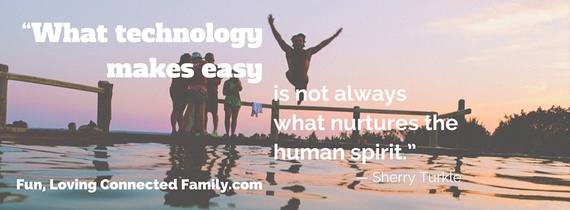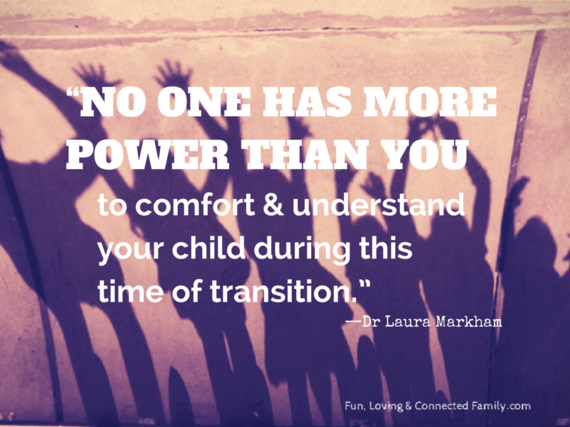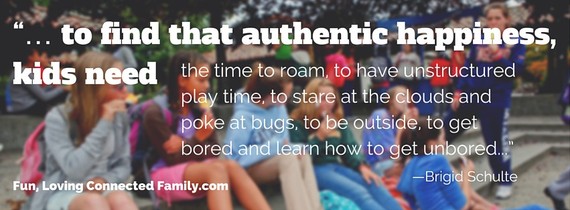
"You alone are enough. You have nothing to prove to anyone." - Maya Angelou
Maya's sage words are my north star as I navigate my 50s. Even though it's taken me five decades of experience and a fair share of heartache to reach a place of profound self-confidence -- loving and approving of myself in the moment is a powerfully potent way to experience life.
And as the mother of a tweenage son, I've been wondering how to impart an abiding sense of self-love and self-approval for my son -- especially now -- as he navigates the shape-shifting world of middle school friendships.
Childhood is fleeting -- quicksilver moments that are running through our hands -- moments that all too soon will be gone forever.
Welcome to the Thunderdome
Who would have thought that middle school could've gotten any more treacherous than when we last walked those perilous halls?
Previous generations didn't have to negotiate the digital expediency that exponentially broadcasts the fear of FOMO and mean kid conformity that downsizes so many dreams and categorically deconstructs self-esteem for tweenagers today.
How can we support our children to deeply and profoundly know and experience that being their own best friend is the rock solid foundation -- not just for their school years, but for every age and stage in life?
So, what are the abiding qualities of our closest friendships? I'd say it's the experience of being seen and loved for our true and vulnerable selves -- with the people who have earned that right.
It follows that the key to cultivating a life-long friendship with ourselves should start within our families, creating a rock solid foundation and a safe haven as our children navigate the sea change from childhood to adolescence.
How Can We Can Nurture Our Children's Ability to Be Their Own Best Friend?
We've Got to Disconnect to Get Connected
When we're checking in with our kids about what's happened during their day, are our eyes darting over to a screen, checking for texts or scanning through emails?
Children feel hurt by this lack of attention, says Catherine Steiner-Adair, a clinical and consulting psychologist, who interviewed 1,000 children, along with many parents, teachers and young adults, about the role of screens in children's lives in researching her book, The Big Disconnect: Protecting Childhood and Family Relationships in the Digital Age.
"Children of all ages -- 2, 15, 18, 22 -- used the same phrases to talk about how hard it is for them to get their parents' attention when they need it: sad, angry, mad, frustrated," Steiner-Adair says.
How can expect that our children develop an abiding sense of self-worth if we're communicating that they're less important than the digital device that continually hijacks our time and attention?
Aside from our own behavior, as parents, we need to know that one of the huge worries for many Tweenagers is FOMO (fear of missing out).
FOMO triggers exist mostly online and especially on social media -- so getting off the grid brings the benefits of letting our kids experience the value of being the center of their own universe as opposed to the peer pressure of being obsessively aware of what 'everyone else' is doing.
Disconnecting gives us and our children the space to release the perfectionism and comparison of our 'always on' digital culture that undermines our experience of 'being enough' and loving and appreciating what we're creating and experiencing in our own lives.
Make Time to Give Our Kids Our Undivided Attention
We all need to be giving our kids our undivided attention at some point in the day. Making full eye contact, mirroring what our children are sharing with us and having some kind of physical connection while we're checking in with them all signal that we value our children.
It doesn't need to be for a long stretch of time -- this is not about obsessive "lawn mower parenting," but making sure we finding a daily connection points with each other.
The Other Side of Attention: Let's Give Our Kids the Bliss of Being Bored
Just as we're hard wired to seek connection -- and never more so than in the middle school arena -- what we're losing in our 24/7 'always on, always connected' tech saturated lives is what MIT professor Sherry Turkle calls the experience of constant, boredom-free connection that makes it nearly impossible to be with and appreciate ourselves -- with the messy, unedited and sometimes boring experience of our own lives.
Showing our children how to be their own best friends is not necessarily easy, but it's definitely worth teaching by living it ourselves. If our kids are going to let go of "what will people think?" perfectionism and rock healthy striving to demonstrate the foundation of lifelong self-love and appreciation, they need to see us fulfilling ourselves too.
Parents, Are We Demonstrating These Qualities of Being Our Own Best Friends?
- Are we good at protecting our personal time?
Our family life came to a crossroads when I realized that I could create a new dynamic that nurtured real connection and brought balance back into our family life -- especially now as my son is navigating this time of transition from childhood to adolescence. If you'd like to know how to revive your family dynamic and transform the quality of the time you spend together, find out how to do that here.
Resources:
Dr. Catherine Steiner-Adair, The Big Disconnect: Protecting Childhood and Family Relationships in the Digital Age
Sherry Turkle, Connected but Alone


